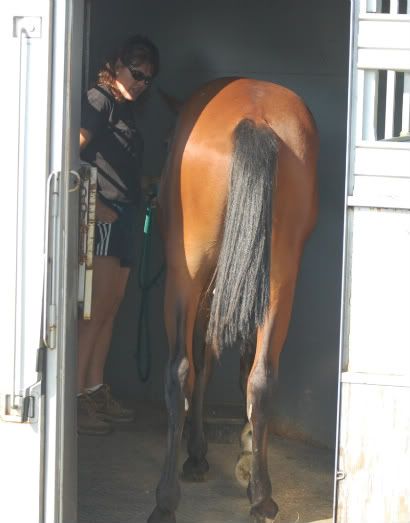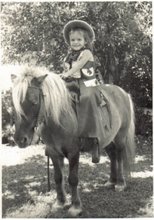
Ideally, my horses should walk into the trailer without needing me to walk in first. I'm glad Darby is a yearling. Before he is full grown and takes up most of the trailer space, I want him to be comfortable going in and out without me squeezing in there too. I feel unsafe when I am in a trailer with a horse because the space is so crowded.

In training, you never start at your goal. You start way before that and you find ways to break the training down into little bits that are easy for the horse to grasp. Darby already targets on my hand and leads well, so I led him, slowly and snorting, up to the scary open trailer door. He stopped at the step so I went in ahead of him and I gave little tugs on the lead rope. When he stuck his head in the door, reaching toward me, I clicked my tongue and gave him a treat. Right then, I could see his focus change from being scared to thinking, "Hey! Peppermint! I want some more." So he sticks his head in a bit further and even picks up a front foot. Click, treat.
He's on to the game now. One foot in the trailer, click, treat. He backs up, puts his foot back on the ground. But I note that he moves his hind legs further underneath his barrel, making it easier for him to lift up his front end. He stands and thinks about it. He sticks his head toward me, I put out my target hand, he leans in even further to touch my fist. There is very little going on, physically, but Darby's mental wheels are churning as he tries to reconcile his unease about the trailer with his strong desire for a treat.

The first day I practiced loading Darby, he got on and off the trailer twice in about fifteen minutes. Using clicks and treats, he edged his way into the trailer, stayed in there with me for about twenty seconds, then got scared by the hollow sound his feet made against the floor so he quickly backed out and off the trailer. He stood outside the trailer for a second, collected his cool, and when I resumed my tugs on the lead rope, he came right up into the trailer again. I clicked, he ate his treat, and he backed back off the trailer. Both times he began backing, I said, "back," because I want him to learn to wait for me to tell him to back - but that is the end goal. First he has to learn that the word back in this situation is the same as the word back when he's in his stall or in cross ties.
The other long term goal is to get Darby to be comfortable staying on the trailer. Eventually, he needs to learn that he can't just get on the trailer and back off; he has to stay on the trailer. To do this, once he was loading calmly and reliably, I began putting his jackpot of sweetfeed in the trailer. Since he was now loading so quickly, I didn't need the treats during the loading. The next thing I wanted him to learn was staying in the trailer so I put something in there that made him want to stay.

It is so important that anyone training a horse (or a child) remember that in every single thing you teach there is always a background element of self-control. I am so grateful to be working with Darby while he is a yearling because self-control is a subject like math - what you learn today is built upon what you learned yesterday. Self-control has to be built up day by day until you end up with a horse who has learned to control himself. This is the difference between a horse in the wild and a horse who is expected to get along and thrive in a training situation - the horse in training (or the kid in school) will only be successful if they have learned to have control over themselves.
Control imposed from the outside will always show itself - usually in the worst possible time and place. The only reliable control for anyone, human or not, is self-control. When you create situations over a period of time where your "student" has to practice self-control, you will develop a mature partner rather than an underling who requires constant monitoring. This is true of horses or teenagers-- but it's easier with horses.


2 comments:
glad to see you playing with him and getting all the baby steps in to be ready to go play at the shows. hope to see you out with us next year.
told you he was the smart/ clever one that would have to learn it the right way once ;)
~ Maria
O, Maria, he is so much fun. He is a quick study about everything. I love messing with the babies and watching their minds open to the idea that we can communicate. That is the most rewarding thing of all.
Post a Comment